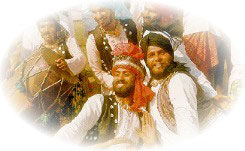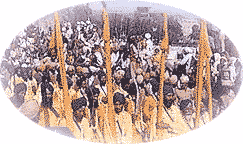| FESTIVALS
IN DELHI |
|
|
|
|
|
| India's
annual religious celebrations are a large part of Delhi's multicultural social
life, and it's well worth trying to take some time out to enjoy the city's
whirl of rowdy activity, traditional dances and vibrant costumes. In addition,
several secular festivals are specific to the capital, when performers gather
for music, dance and drama events. |
|
Lohri
(13th January) :
In this festival, the climax of winter is celebrated with bonfires and singing.
Traditionally, Lohri marks the end of winter. |
|
Kite-Flying
Festival (January) :
Held on Makar Sankranti day on the green lawns above Palika Bazaar,
Connaught Place , this colourful extravaganza attracts national as
well as international participants. |
|
Basant
Panchami (2nd February) :
The biting winter winds continuing till the end of January-early February, when
the Hindu festival of Basant Panchami welcomes the spring. This is the season
when the prestigious Mughal gardens behind
Rashtrapati Bhavan are opened to public for a month. |
|
Thyagaraja
Festival (February) :
An enthusiastic display of south Indian music and dance, opposite Jawaharlal
Nehru University in Vaikunthnath temple. |
|
Maha
Shivratri (March) :
Maha
Shivratri is celebrated on the 'Amavasya' night of 'Phalguna'. It is said Lord
Shiva danced the 'Tandava Nritya', which means cosmic dance on this dark night.
He is worshipped at temples with all night vigils and prayers and unmarried
women keep day-long fasts so that Shiva may grant them good husbands. |
|
Amir
Khusrau's Anniversary (April) :
Amir Khusrau's Anniversary is celebrated in April, with a
fair in Nizamuddin and prayers and 'qawwali' singing. The event also sees the
National Drama Festival, staged mostly at the Rabindra Bhawan. |
|
Baisakhi
(13th April) :
In north India, the Hindu New Year is celebrated on Baisakhi in mid-April just
as the sun begins to get fierce and the dusty winds herald summer. It is also
known as the beginning of the harvest season. |
 |
|
|
Buddha
Jayanti (May) :
The first full moon night in May marks the birth of the Lord Buddha. Prayer
meetings are held at Buddha Vihar, Ring Road and Buddha Vihar, Mandir Marg.
Buddha Purnima is the month of 'Vaisakha', commemorates not just Lord Buddha's
birth, but also his 'Enlightenment' and gaining 'Nirvana'. |
|
Mahavir
Jayanti (May) :
The birth of Lord Mahavira, who founded Jainism, is celebrated around this time
of the year with prayers and processions. |
|
International
Mango Festival (July) :
A peculiar event, with over five hundred types of mango on show, usually
in Talkatora Stadium. Tourists can enjoy free tastings and a cultural programme
to sample. |
|
Phoolkwalon-ki-Sair
(October) :
In early October, a festival specific to Mehrauli, in Delhi, takes place. This
is the Phulwalon-ki-Sair or the Flower Sellers Procession, which originated in
the 16th century.
|
|
| The highlight is a procession of people
carrying decorated floral fans, which are blessed at the shrine of the 13th
century Sufi saint, Khwaja Utb-ud-din Bakhtyar Kaki and at the Hindu temple of
Jogmaya, both in Mehrauli. The procession ends with a formal ceremony at the
Jahaz Mahal, a 16th century pleasure resort by the side of a lake. |
|
Qutub
Festival (October) :
Delhi Tourism organises the popular Qutub Festival in October. Musicians and
dancers perform at night by the city's 12th century landmark, the
Qutub Minar . This festival gives tourists a glimpse of the cultural
grandeur of India. |
|
Guru
Purab (November - December) :
Guru Purab is the celebration of the birth of first of the ten Sikh gurus, Guru
Nanak. 'Nagar Kirtans' are taken out through the streets and in the Gurdwaras,
'Granthees' recite verses from the Guru Granth Sahib, the holy book of Sikhs. |
 |
|
|
Christmas
(25th December) :
On 25th of December the capital witnesses special Christian Eve entertainment's
at its all-major hotels and restaurants and the midnight mass and services at
all churches.
|
|
New
Year's Eve (31st December) :
The culmination of the Indian festive spirit is celebrated on the 31st of
December, with most hotels and restaurants offering special food and
entertainment. |
|
|
|
|
|